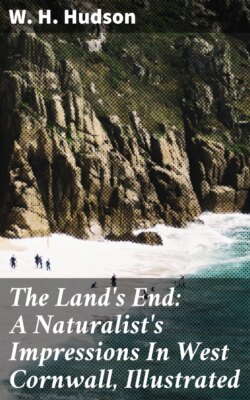Читать книгу The Land's End: A Naturalist's Impressions In West Cornwall, Illustrated - W. H. Hudson - Страница 6
На сайте Литреса книга снята с продажи.
Original
ОглавлениеThey were two sisters, aged eight and nine respectively, and their little brother, about six or seven years old. They rambled along the rough heath by Carbis Bay to the Towans, near Lelant, where, climbing about among the sand-hills, they lost all sense of direction. There meeting a man who spoke roughly to them and ordered them home they became terrified and ran away to the sea-front, and, climbing down the cliff, hid themselves in a cave they found there. By and by it began to grow dark, and there were sounds above as of loud talking and shouts and of a galloping horse, all which added to their fear and caused them to go further into their dark wet house of refuge. They did not know, poor children, that the cries were uttered by those who were seeking for them! After dark the tide rose and covered the sandy floor of the cave, and to escape it they climbed on to a rocky shelf where they could keep dry, and there huddled together to keep warm, and being very tired, they eventually fell asleep. In the morning when it grew light the sisters woke, stiff and cold, to find that their poor little brother had fallen from the ledge in his sleep and had been carried out by the sea. His body was recovered later. The two survivors, now middle-aged women, still live in the town.
The most interesting hour of the day at St. Ives was in the afternoon or evening, the time depending on the tide, when the men issued from their houses and came lurching down the little crooked stone streets and courts to the cove or harbour to get the boats out for the night's fishing. It is a very small harbour in the corner of the bay-a roughly shaped half-moon with two little stone piers for horns, with just room enough inside to accommodate the fleet of about 150 boats. The best spectacle is when they are taken out at or near sunset in fair weather, when the subdued light gives a touch of tenderness and mystery to sea and sky, and the boats, singly, in twos and threes, and in groups of half a dozen, drift out from the harbour and go away in a kind of procession over the sea. The black forms on the moving darkening water and the shapely deep-red sails glowing in the level light have then a beauty, an expression, which comes as a surprise to one unaccustomed to such a scene. The expression is due to association-to vague suggestions of a resemblance in this to other scenes. We may be unable to recall them; the feeling returns but without the mental image of the scene which originally produced it. It was not until I had watched the boats going out on two or three successive evenings that an ancient memory returned to me.
Sitting or walking by the margin of some wide lake or marsh in a distant land, I am watching a company of birds of some large majestic kind-stork, wood-ibis, or flamingo-standing at rest in the shallow water, which reflects their forms. By and by one of the birds steps out of the crowd and moves leisurely away, then, slowly unfolding his broad wings, launches himself on the air and goes off, flying very low over the water. Another follows, then, after an interval, another, then still others, in twos and threes and halfdozens, until the last bird has opened his wings and the entire flock is seen moving away in a loose procession over the lake.
Just in that way did the crowd of boats move by degrees from their resting-place, shake out their wing-like sails, and stream away over the sea.
That was one scene; there were faint suggestions of many others, only a few of which I could recover; one was of large, dark red-winged butterflies, seen at rest with closed wings, congregated on wind-swayed reeds and other slender plants. It was the shape and deep red colour of the sails and the way they hung from the masts and cordage which restored this butterfly picture to my mind. And in every instance in which a resemblance could be traced it turned out to be to some natural and invariably to a beautiful object or scene. The spectacle had, in fact, that charm, which is so rare in man's work, of something wholly natural, which fits into the scene and is part and parcel with nature itself.
In buildings we get a similar effect at the two extremes-in the humblest and the highest work of man's hands; in the small old thatched and rose-and creeper-covered cottage in perfect harmony with its surroundings, and in ancient majestic castles and cathedrals, in which the sharp lines and contours have been blurred by decay of the material and the whole surface weathered and stained with lichen and alga and in many cases partially draped with ivy.
It struck me before I had been long in St. Ives that, in spite of the delightful mildness of the climate and the charm of the place, nobody but myself was wintering there. The lodging-houses were quite empty; the people were the natives or else the artists, who form a pretty numerous colony. The few others to be seen were visitors for the day from Penzance, Falmouth, or some other spot in the "Cornish Riviera." This was not a cause of regret, seeing there were birds for society, especially that old favourite, the jackdaw.
